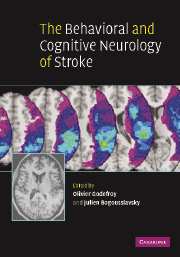Book contents
- Frontmatter
- Contents
- Contributors
- Preface
- 1 Evaluation of cognitive and behavioral disorders in the stroke unit
- Motor and gestural disorders
- Aphasia and arthric disorders
- Hemineglect, Anton–Babinski and right hemisphere syndromes
- Agnosia and Bálint's syndrome
- Executive and memory disorders
- Behavioral and mood disorders
- 22 Akinetic mutism and related disorders
- 23 Alterations of level of consciousness related to stroke
- 24 Delirium and confusional state in stroke patients
- 25 Post-stroke delusion
- 26 Acute behavioral and mood changes
- 27 Stroke and personality change
- 28 Post-stroke mania
- 29 Depression after stroke
- 30 Fatigue
- Dementia and anatomical left/right syndromes
- Index
- References
30 - Fatigue
Published online by Cambridge University Press: 10 October 2009
- Frontmatter
- Contents
- Contributors
- Preface
- 1 Evaluation of cognitive and behavioral disorders in the stroke unit
- Motor and gestural disorders
- Aphasia and arthric disorders
- Hemineglect, Anton–Babinski and right hemisphere syndromes
- Agnosia and Bálint's syndrome
- Executive and memory disorders
- Behavioral and mood disorders
- 22 Akinetic mutism and related disorders
- 23 Alterations of level of consciousness related to stroke
- 24 Delirium and confusional state in stroke patients
- 25 Post-stroke delusion
- 26 Acute behavioral and mood changes
- 27 Stroke and personality change
- 28 Post-stroke mania
- 29 Depression after stroke
- 30 Fatigue
- Dementia and anatomical left/right syndromes
- Index
- References
Summary
Introduction
Fatigue is a non-specific symptom associated with a wide range of states and diseases. The feeling of fatigue is a frequent complaint in various medical conditions, including psychiatric diseases (mainly depression, anxiety, and somatoform disorders), cancer, autoimmune, endocrinological, infectious, rheumatological and neurological affections, and sleep disorders. Fatigue may also develop without any antecedent condition other than a viral infection, leading to what is known as “chronic fatigue syndrome” (Holmes et al., 1988). Some medical and pharmacological treatments (cytokines, interferon, radiotherapy, chemotherapy), physical or mental exertions, or particular environmental or psychological conditions (extreme temperature, stress, inactivity) can also induce fatigue.
Fatigue is an extremely widespread, and often benign, symptom in the general population, headaches being the only somatic complaint occurring at a higher frequency. In general practice, fatigue is a significant symptom in 10–30% of outpatients, presenting as an isolated symptom in only 1–3% of these (Kroenke and Price, 1993; Fuhrer and Wessely, 1995). Because the phenomenon constitutes an evil of modern society, the distinction between normal benign fatigue and abnormal fatigue is very difficult to make. Severity, chronicity, and an association with other symptoms or functional disability all point to a pathological condition.
The origin of fatigue can be attributed to general non-specific factors characterizing most diseases, such as pain, sleep disorders, depression, anxiety, inactivity, or to specific variables related to disease pathophysiology or treatment. The pathophysiological mechanisms are usually divided into central and peripheral causes, the latter being better known and better understood.
- Type
- Chapter
- Information
- The Behavioral and Cognitive Neurology of Stroke , pp. 571 - 585Publisher: Cambridge University PressPrint publication year: 2007
References
- 1
- Cited by



